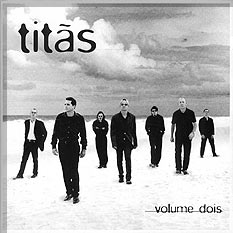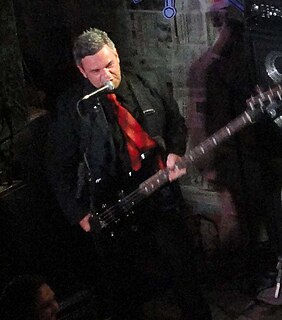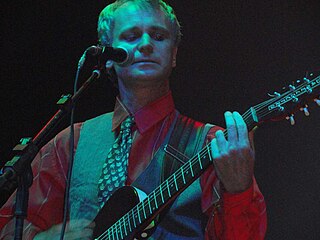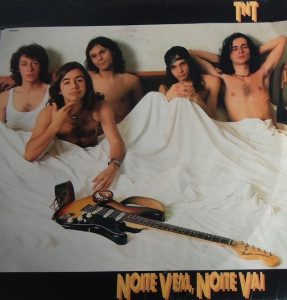This article needs additional citations for verification .(May 2019) (Learn how and when to remove this template message) |
| TNT | ||||
|---|---|---|---|---|
 | ||||
| Studio album by | ||||
| Released | 1987 | |||
| Genre | Rock, rockabilly, rock and roll | |||
| Length | 41:02 | |||
| Label | RCA Records | |||
| Producer | Reinaldo B. Brito | |||
| TNT chronology | ||||
| ||||
TNT, also referred to as TNT I, is the debut album by the eponymous Brazilian rock band TNT, their first of two self-titled albums. It was released in 1987 through RCA Records, and is considered a cornerstone of the Rio Grande do Sul rock scene from the mid-1980s/early 1990s. [1] A critical and commercial success, it spawned a handful of hits, such as "Entra Nessa", "Estou na Mão", "Ana Banana" and "Identidade Zero" (all of them co-written by former vocalist Flávio Basso, prior to his departure from the band), which catapulted the group into nationwide fame and paved their way for a second release one year later. [2]
Rock music is a broad genre of popular music that originated as "rock and roll" in the United States in the early 1950s, and developed into a range of different styles in the 1960s and later, particularly in the United Kingdom and in the United States. It has its roots in 1940s and 1950s rock and roll, a style which drew heavily on the genres of blues, rhythm and blues, and from country music. Rock music also drew strongly on a number of other genres such as electric blues and folk, and incorporated influences from jazz, classical and other musical styles. Musically, rock has centered on the electric guitar, usually as part of a rock group with electric bass, drums, and one or more singers. Usually, rock is song-based music usually with a 4/4 time signature using a verse–chorus form, but the genre has become extremely diverse. Like pop music, lyrics often stress romantic love but also address a wide variety of other themes that are frequently social or political.
TNT was a Brazilian rock group from Porto Alegre, Rio Grande do Sul. One of the first rock bands from Rio Grande do Sul to acquire mainstream success nationwide alongside its "sister project" Os Cascavelletes, they are known for hits such as "Entra Nessa", "Estou na Mão", "Ana Banana", "Cachorro Louco" and "A Irmã do Dr. Robert".
RCA Records is an American record label owned by Sony Music, a subsidiary of Sony Corporation of America. It is one of Sony Music's four flagship labels, alongside RCA's former long-time rival Columbia Records, Arista Records, and Epic Records. The label has released multiple genres of music, including pop, classical, rock, hip hop, electronic, R&B, blues, jazz, and country. Its name is derived from the initials of its defunct parent company, the Radio Corporation of America (RCA). It was fully acquired by Bertelsmann in 1986, making it a part of Bertelsmann Music Group (BMG); however, RCA Records became a part of Sony BMG Music Entertainment, a merger between BMG and Sony Music, in 2004, and was acquired by the latter in 2008, after the dissolution of Sony BMG and the restructuring of Sony Music. It is the second oldest record label in American history, after sister label Columbia Records.
Contents
The album's cover art was allegedly inspired by New Order's 1983 release Power, Corruption & Lies .

New Order are an English rock band formed in 1980 by vocalist and guitarist Bernard Sumner, bassist Peter Hook, and drummer Stephen Morris. The band formed after the demise of Joy Division, following the suicide of lead singer Ian Curtis; they were joined by Gillian Gilbert on keyboards later that year. New Order's integration of post-punk with electronic and dance music made them one of the most acclaimed and influential bands of the 1980s. They were the flagship band for Manchester-based independent record label Factory Records and its nightclub The Haçienda, and worked in long-term collaboration with graphic designer Peter Saville.

Power, Corruption & Lies is the second studio album by English rock band New Order, released on 2 May 1983 by Factory Records. The album features more electronic tracks than their 1981 debut Movement, with heavier use of synthesisers. It was included in the top 100 albums of the 1980s lists in both Rolling Stone and Pitchfork Media.
















